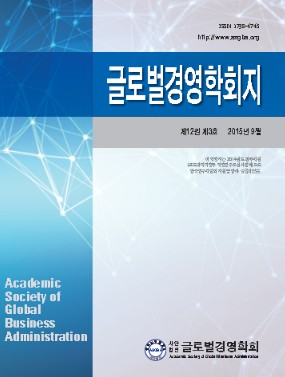학술논문
자국 식품 문화코드를 내포한 수입 식품에 대한 소비자의 구매의도에 관한 연구
이용수 205
- 영문명
- A Study on the Chinese Consumer s Buying Intention for Imported Food Containing Chinese Food Culture Code - Focus on Beijing and Sanghai Market -
- 발행기관
- 글로벌경영학회
- 저자명
- Huang Fei 양석준(Yang Suk Joon)
- 간행물 정보
- 『글로벌경영학회지』글로벌경영학회지 제13권 제4호, 107~133쪽, 전체 27쪽
- 주제분류
- 경제경영 > 경영학
- 파일형태
- 발행일자
- 2016.12.30
6,040원
구매일시로부터 72시간 이내에 다운로드 가능합니다.
이 학술논문 정보는 (주)교보문고와 각 발행기관 사이에 저작물 이용 계약이 체결된 것으로, 교보문고를 통해 제공되고 있습니다.

국문 초록
식품의 글로벌화가 진행되면서 많은 국가들은 자국 식품의 수출에 많은 관심을 기울이고 있다. 한국 정부 또한 최근 한류를 통한 K-FOOD의 확산에 많은 관심을 가지고 노력을 기울이고 있으나, 한류의 영향이 미치는 지역 외의 한국 식품의 수출은 많은 어려움을 격고 있다. 많은 학자들은 식품을 수출하는데 가장 중요한 것은 바로 수출 대상 국가의 식품 문화(food culture)를 이해하는 것이라고 지적하고 있다. 이러한 지적에도 불구하고 각 국가들의 식품에 대한 문화를 실제 활용하능한 전략 수준에서 연구한 결과를 찾아보기는 쉽지 않다. 본 연구에서는 한국의 가장 큰 수출 대상국가 중 하나라고 할 수 있는 중국 소비자들의 식품에 대한 문화코드를 찾아보고 이러한 식품문화코드가 소비자들에게 작용하는 과정을 밝혀내며, 이를 통하여 식품문화코드의 적절한 활용방법을 찾아보고자 한다. 이에 본 연구는 과거 문헌 고찰을 통하여 중국인의 식품문화코드로 건강성, 유대감 형성, 식품 체험의 3가지 문화코드를 제시하였으며, 이러한 코드와 외국식품 구매의도간의 관계를 공분산구조모형 분석을 통하여 살펴보았다. 북경과 상해지역 거주 소비자 306명을 대상으로 설문조사를 수행하였으며 설문에 부실하게 응답한 24명을 제외한 282명의 응답을 분석에 사용하였다. 분석 결과 건강성은 지각된 문화정체성과 태도를 통하여 외국식품 구매의도에 영향을 미치는 것으로 나타났으며, 유대감 형성은 지각된 문화정체성에 직접 영향을 미치고, 태도를 매개로 외국식품 구매의도에 영향을 미치는 것으로 나타났다. 마지막으로 식품 체험은 지각된 문화정체성에는 영향을 미치지 않고 바로 태도를 매개로 외국식품 구매의도에 영향을 미치는 것으로 나타났다. 본 연구의 결과에 대한 이론적 시사점은 첫째 식품에 대한 문화코드를 식별할 수 있음을 확인한 점, 둘째 중국의 식품 문화코드를 밝혀내었다는 점, 마지막으로 식품 문화코드와 식품에 대한 구매의도간의 매개 변수를 확인했다는 점이라고 할 수 있다. 또한 본 연구는 실무자들에게 중국의 문화코드를 이해하여 보다 효율적인 식품 마케팅 전략을 구축할 수 있는 정보를 제공하였다는 점에서 실무적 의의를 찾아볼 수 있다.
영문 초록
As the food globalization progressed, many countries have interest in the export their own food to other countries. Korean government also has interest in spreading out K-food on the world. Despite of the food export effort of Korean government and Korean food companies, we can watch the slow growth of food export performance. Scholars point out the most important factor which help food export is understanding the food culture of target country to export, but it is hard to find the studies on food culture code. In this study we find out the food culture code of China and also figure out how to use Chinese consumer’s culture code for export Korean food to Chinese market. Referring to previous researches, we identify Chinese food culture code – healthiness, connectedness formation and food experience. As the research model, this study set the model that the factors of healthiness, connectedness formation and food experience influenced on the consumer s buying intension in mediation of the perceived cultural identity and consumer’s attitude toward food. The hypothesis verification for the research model was carried out through the structural equation model. The survey was carried out to the consumers of Shanghai and Beijing. 306 survey data was gathered and we exclude 24 poor response survey data. Finally, we analyze 282 survey data for the prove research model. As the results of this study, it was appeared that the healthiness and connectedness formation affected positive (+) influence on the perceived cultural identity. And it is found that the food experience does not influence on the perceived cultural identity. And it was appeared that the healthiness and food experience affected positive (+) influence on the attitude. And it is found that the connectedness formation does not influence on the attitude. Perceived cultural identity affect positive (+) influence on the attitude and attitude do positive (+) influence on the buying intention of imported food. But it is found that the perceived cultural identity does not influence on the buying intention of imported food. The meanings of this study are as follows. First, this study could be meaningful in that this study confirm the importance of culture code to global marketing. Second, identifying food culture codes of Chinese consumer is the meaningful results of this study. Third finding out the mediator between the food culture code and buying intention also the meaning of this study. And finally the results of this study is very helpful to the food marketers who have interest in the export of food to China.
목차
요약
Ⅰ. 서론
Ⅱ. 이론적 고찰
Ⅲ. 연구의 가설 설정
Ⅳ. 연구의 결과
Ⅴ. 결론
참고문헌
Abstract
해당간행물 수록 논문
- Financial Performance and Reporting Practices of the Philippine Deposit Insurance Corporation
- A Study on the Relationship between Job Seeking via Social Networks and Organizational Effectiveness
- A Study on Dynamic Relation between Fund Flows and Returns
- The Effect of Asset Revaluation on Capital Costs
- 옴니채널을 통한 구매가 브랜드 인지도, 브랜드 친숙도와 재이용 의도에 미치는 영향
- 이익투명성이 재무분석가의 이익예측에 미치는 영향
- 회계의 보수성으로 측정한 산업별 시장점유 1위 감사인의 감사품질
- The Comparison of Corporate Income Tax between China and South Korea
- 상호저축은행의 자산운용이 수익성과 안전성에 미치는 영향 분석
- 기업의 통합보고 결정요인
- 품질코스트시스템에 관한 실태분석
- 자국 식품 문화코드를 내포한 수입 식품에 대한 소비자의 구매의도에 관한 연구
참고문헌
교보eBook 첫 방문을 환영 합니다!

신규가입 혜택 지급이 완료 되었습니다.
바로 사용 가능한 교보e캐시 1,000원 (유효기간 7일)
지금 바로 교보eBook의 다양한 콘텐츠를 이용해 보세요!






